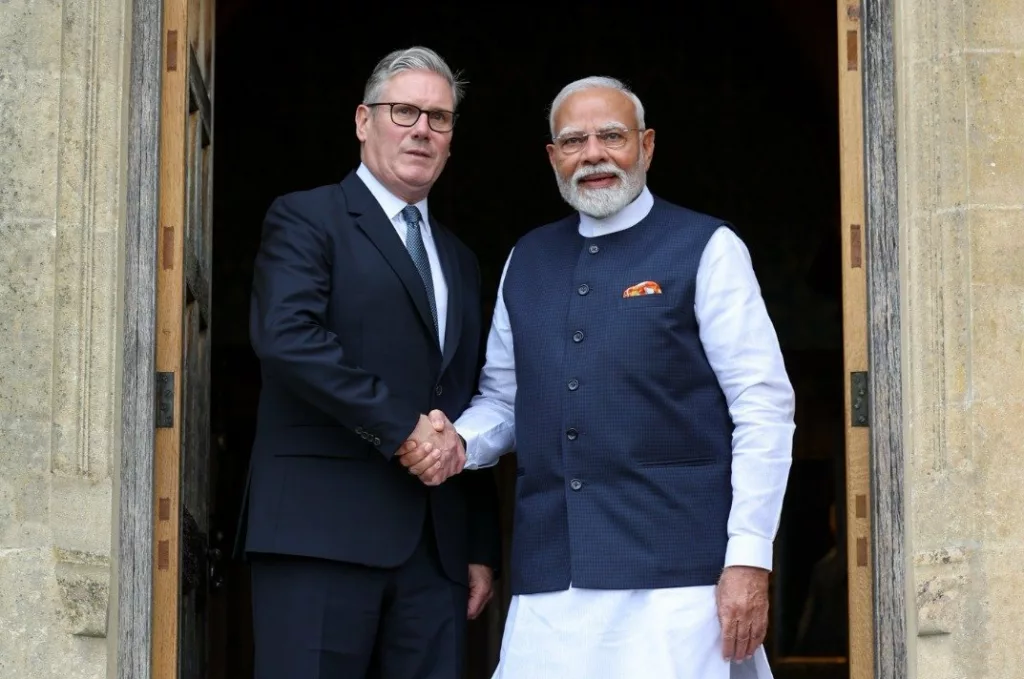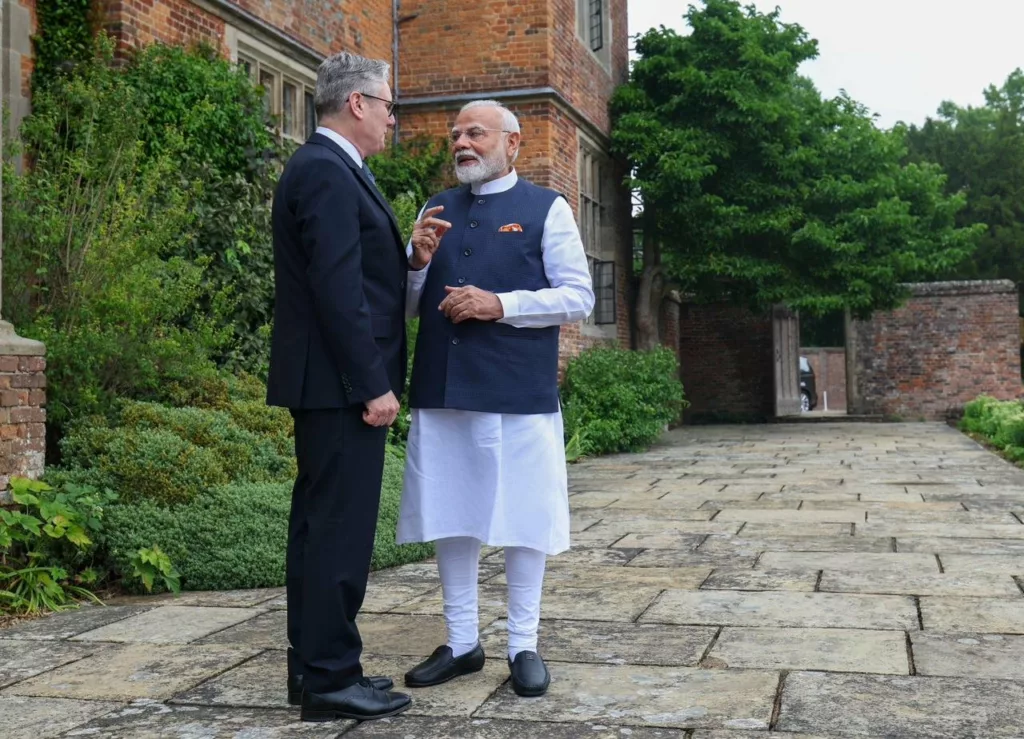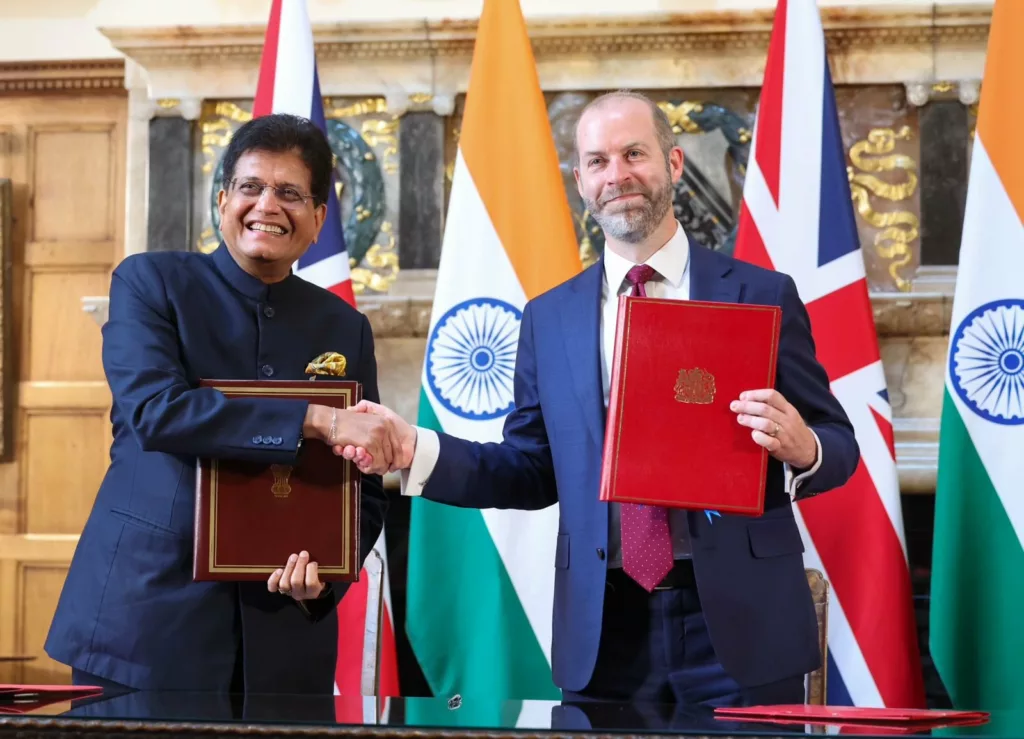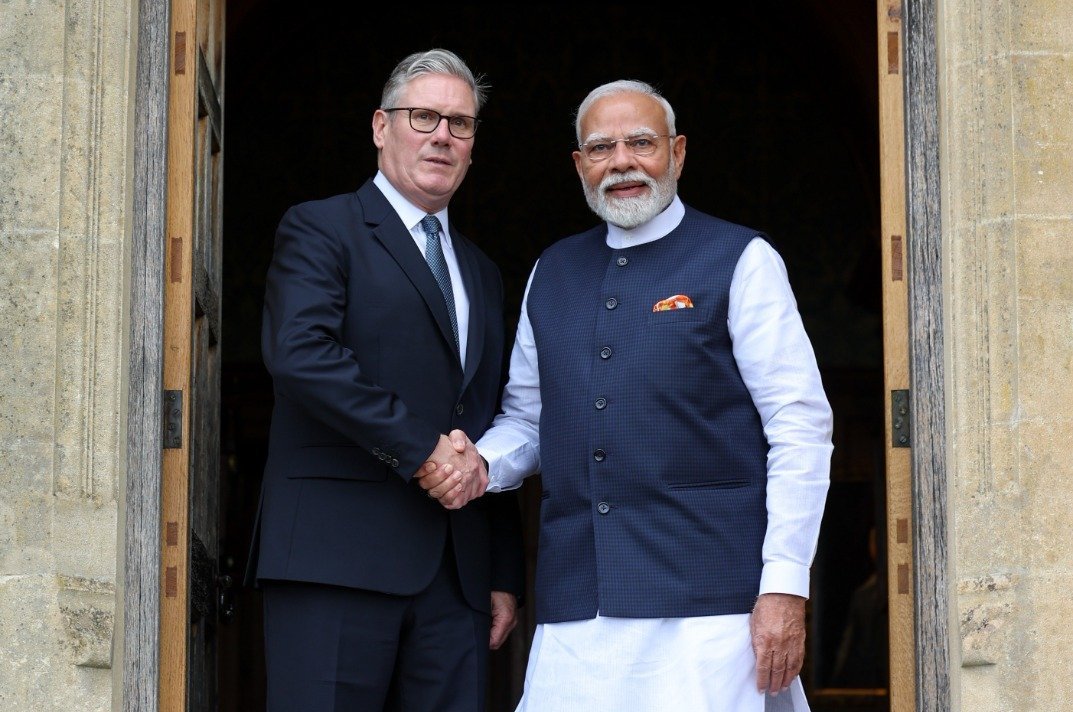 Indian Prime Minister Narendra Modi with Prime Minister of the United Kingdom Keir Starmer at Chequers. Photo courtesy: X/@narendramodi
Indian Prime Minister Narendra Modi with Prime Minister of the United Kingdom Keir Starmer at Chequers. Photo courtesy: X/@narendramodi
India and the UK on Thursday signed a landmark trade deal to boost two-way trade by eliminating tariffs on cars, textiles, whisky and range of other products as Prime Minister Narendra Modi and his UK counterpart Keir Starmer firmed up the ‘Vision 2035’ strategy to expand ties in areas of defence, technology, clean energy and migration.
The Comprehensive Economic and Trade Agreement (CETA), inked by Commerce Minister Piyush Goyal and his UK counterpart Jonathan Reynolds in presence of the two prime ministers, seeks to enhance bilateral trade by around USD 34 billion annually besides ensuring better market access.
The trade pact, which is Britain’s biggest such deal since its exit from the European Union, came amid growing global concern over US President Donald Trump’s tariff tussle.
Starmer said in an X post: “Our landmark trade deal with India is a major win for Britain. This is about putting more money in the pockets of hardworking Brits and helping families with the cost of living.”
Also read: India-UK Free Trade Deal promises cheaper imports, USD 8.15 billion in investment
The two sides have also agreed to negotiate a Double Contribution Convention (DCC) that will provide for exempting employers of Indian workers from paying social security contributions in the UK for up to three years. The DCC will come into effect along with the CETA.
Following the Modi-Starmer talks at Chequers, the countryside residence of the British PM, India and the UK also unveiled a defence industrial roadmap for co-development and co-production of key defence products and platforms.
 Indian Prime Minister Narendra Modi with Prime Minister of the United Kingdom Keir Starmer in the garden at Chequers. Photo courtesy: X/@narendramodi
Indian Prime Minister Narendra Modi with Prime Minister of the United Kingdom Keir Starmer in the garden at Chequers. Photo courtesy: X/@narendramodi
The Indian side also flagged its concerns to the UK over increasing activities of pro-Khalistani elements from British soil, with Modi asserting that forces with “extremist ideologies” must not be allowed to misuse democratic freedoms.
In line with their resolve to boost security cooperation, an agreement was signed between Central Bureau of Investigation (CBI) and the UK’s National Crime Agency.
However, the central focus during PM Modi’s visit to the UK was the historic trade deal that is expected to ensure comprehensive market access for Indian goods across all sectors.
India will gain from tariff elimination on about 99 per cent of tariff lines (product categories) covering almost 100 per cent of the trade values.
“This agreement is more than just an economic partnership; it is also a blueprint for shared prosperity,” Modi said in his media statement.
“On one hand, it paves the way for enhanced market access in the UK for Indian textiles, footwear, gems and jewellery, seafood, and engineering goods. It will also unlock new opportunities for India’s agricultural produce and processed food industry. Above all, this agreement will be especially beneficial for India’s youth, farmers, fishermen, and the MSME sector,” he said.
“On the other hand, products made in the UK, such as medical devices and aerospace parts, will be available to the people and industry of India at accessible and affordable rates,” he added.
Starmer said that the trade deal would lower prices on Indian goods, including clothes, shoes and food. “Our landmark trade deal with India is a major win for Britain. It will create thousands of British jobs across the UK, unlock new opportunities for businesses and drive growth in every corner of the country,” he said.
The two sides also unveiled the “Vision 2035” partnership that reaffirms their shared commitment to “unlocking” the full potential of a “revitalised” partnership.
 The Comprehensive Economic and Trade Agreement (CETA) is inked by Indian Commerce Minister Piyush Goyal and his UK counterpart Jonathan Reynolds. Photo courtesy: X/@narendramodi
The Comprehensive Economic and Trade Agreement (CETA) is inked by Indian Commerce Minister Piyush Goyal and his UK counterpart Jonathan Reynolds. Photo courtesy: X/@narendramodi
“This will serve as a roadmap for a strong, trusted, and ambitious partnership in the areas of technology, defence, climate, education, and people-to-people connectivity,” said Modi. “It is our commitment that, from AI (Artificial Intelligence) to critical minerals, semiconductors to cyber security, we shall create the future together,” he said.
“Vision 2035” would infuse greater ambition and renewed momentum in the Comprehensive Strategic Partnership by steering the relationship for the next 10 years in key areas of economy and growth, said the Indian Ministry of External Affairs (MEA).
Modi and Starmer expressed satisfaction at the growing collaboration in new and emerging technologies and called for accelerated implementation of the Technology and Security Initiative (TSI).
The TSI, firmed up one year ago, focuses on telecom, critical minerals, AI, biotechnology and health technology, semiconductors, advanced materials and quantum.
The two prime ministers also welcomed the growing partnership between India and the UK in the education sector, with six UK universities working to open campuses in India under the New Education Policy (NEP).
In a social media post, Modi described his talks with Starmer as “outstanding”.
“The talks with PM Keir Starmer were outstanding, particularly in the wake of the successful signing of the Comprehensive Economic and Trade Agreement. In addition to economic cooperation, this agreement sets the stage for boosting shared prosperity,” he said.
In the talks, the Indian side also flagged its concerns over increasing activities of pro-Khalistani elements in the UK. “We agree that forces with extremist ideologies must not be allowed to misuse democratic freedoms. Those who misuse democratic freedoms to undermine democracy itself must be held to account,” Modi said.
There have been increasing concerns in India about activities of pro-Khalistani elements in the UK, especially after an attack on the Indian High Commission in London in March 2023.

